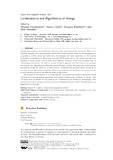| dc.contributor.author | Crochemore, Maxime | |
| dc.contributor.author | Currie, James D. | |
| dc.contributor.author | Kucherov, Gregory | |
| dc.contributor.author | Nowotka, Dirk | |
| dc.date.accessioned | 2018-01-16T14:53:52Z | |
| dc.date.available | 2018-01-16T14:53:52Z | |
| dc.date.issued | 2014-03-09 | |
| dc.identifier.citation | Crochemore, Maxime, James D. Currie, Gregory Kucherov, and Dirk Nowotka.“Combinatorics and Algorithmics of Strings (Dagstuhl Seminar 14111).” Dagstuhl Reports 4(3) (2014): 28-46. DOI: 10.4230/DagRep.4.3.28. | en_US |
| dc.identifier.issn | 2192-5283 | |
| dc.identifier.uri | http://hdl.handle.net/10680/1350 | |
| dc.description | Edited in cooperation with Robert Mercaş | en_US |
| dc.description.abstract | Strings (aka sequences or words) form the most basic and natural data structure. They occur whenever information is electronically transmitted (as bit streams), when natural language text is spoken or written down (as words over, for example, the Latin alphabet), in the process of heredity transmission in living cells (through DNA sequences) or the protein synthesis (as sequence of amino acids), and in many more different contexts. Given this universal form of representing information, the need to process strings is apparent and is actually a core purpose of computer use. Algorithms to efficiently search through, analyze, (de-)compress, match, encode and decode strings are therefore of chief interest. Combinatorial problems about strings lie at the core of such algorithmic questions. Many such combinatorial problems are common in the string processing efforts in the different fields of application. | en_US |
| dc.description.uri | http://drops.dagstuhl.de/opus/volltexte/2014/4552/ | |
| dc.language.iso | en | en_US |
| dc.publisher | Dagstuhl Publishing | en_US |
| dc.rights | info:eu-repo/semantics/openAccess | |
| dc.subject | combinatorics on words | en_US |
| dc.subject | string algorithms | |
| dc.subject | automata | |
| dc.title | Combinatorics and Algorithmics of Strings | en_US |
| dc.type | Article | en_US |
| dc.identifier.doi | 10.4230/DagRep.4.3.28 | |

